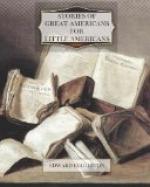They trav-eled in two birch canoes. They took five men to paddle the canoes. They took some smoked meat to eat on the way. They also took some Indian corn. They had trinkets to trade to the Indians. Hatchets, and beads, and bits of cloth were the money they used to pay the Indians for what they wanted.
The friendly Indians in Wis-con-sin tried to per-suade them not to go. They told them that the Indians on the great river would kill them.
The friendly Indians also told them that there was a demon in one part of the river. They said that this demon roared so loud that he could be heard a long way off. They said that the demon would draw the trav-el-ers down into the water. Then they told about great monsters that ate up men and their canoes.
But Mar-quette and the men with him thought they would risk the journey. They would not turn back for fear of the demon or the monsters.
The two little canoes went down the Wis-con-sin River. After some days they came to the Mis-sis-sip-pi. More than a hundred years before, the Spaniards had seen the lower part of this river. But no white man had ever seen this part of the great river. Mar-quette did not know that any white man had ever seen any part of the Mis-sis-sip-pi.
The two little canoes now turned their bows down the river. Some-times they saw great herds of buf-fa-loes. Some of these came to the bank of the river to look at the men in the canoes. They had long, shaggy manes, which hung down over their eyes.
For two weeks the trav-el-ers paddled down the river. In all this time they did not see any Indians. After they had gone hundreds of miles in this way, they came to a place where they saw tracks in the mud. It was in what is now the State of I-o-wa.
Mar-quette and Jo-li-et left the men in their canoes, and followed the tracks. After walking two hours, they came to an Indian village. The Frenchmen came near enough to hear the Indians talking. The Indians did not see them.
Jo-li-et and Mar-quette did not know whether the Indians would kill them or not. They said a short prayer. Then they stood out in full view, and gave a loud shout.
The Indians came out of their tents like bees. They stared at the strangers. Then four Indians came toward them. These Indians carried a peace pipe. They held this up toward the sun. This meant that they were friendly.
The Indians now offered the peace pipe to the French-men. The French-men took it, and smoked with the Indians. This was the Indian way of saying, “We are friends.”
[Illustration: Marquette and Joliet]
Mar-quette asked the Indians what tribe they belonged
to.
They told him that they were of the tribe called the
Il-li-nois.
They took Jo-li-et and Mar-quette into their village. They came to the door of a large wig-wam. A chief stood in the door. He shaded his eyes with both hands, as if the sun were shining in his face. Then he made a little speech.




